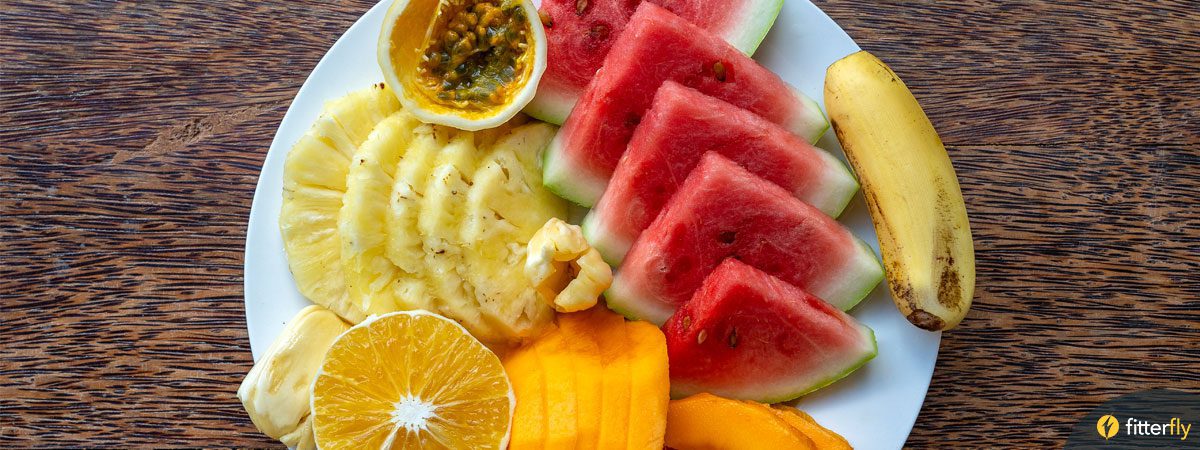
Are you puzzled about selecting the right heart-healthy foods during your weekly supermarket trips? Do you get confused while creating your daily meal plans centering around foods for heart health?
If this is related to you, then we have a list of the top 6 healthy foods for the heart. These foods improve cardiovascular health and reduce your risk of heart disease.
What is the DASH Eating Plan for Cardiovascular Health?
The National Heart, Lung, and Blood Institute (NHLBI) developed an eating approach to manage blood pressure within the optimal range without any medication. It conducted a trial with 459 adults with <160 mmHg systolic and 80–95 mmHg diastolic blood pressure.
A group of study participants was encouraged to consume meals rich in fruits, vegetables, and low-fat dairy foods (DASH eating plan). Their meals had reduced sodium, cholesterol, saturated fat, and total fat and a high percentage of fibre, potassium, calcium, magnesium, and protein.
After 8 weeks, candidates demonstrated a reduction of 5.5 mmHg in systolic blood pressure and 3.0 mmHg in diastolic blood pressure. Following this study, the DASH eating plan was promoted as a healthy food for the heart.
Find your heart's true age to prevent complications.Heart Age Calculator
Top 6 Heart-Healthy Foods
Here is a list of the top 6 foods for heart health, which are usually recommended by nutritionists.
1. Leafy Green Vegetables
Leafy green vegetables are among the top heart-healthy foods, as they are excellent sources of minerals and antioxidants. They are also rich in Vitamin K, which protects arteries and improves blood clotting.
Additionally, green vegetables are beneficial for reducing blood pressure, as they are rich in dietary nitrates.
A 2021 study by Catherine P. Bondonno et al. pointed out that participants consuming a higher percentage of vegetable nitrate could achieve an average 2.58 mmHg reduction in their systolic pressure and 1.38 mmHg reduction in their diastolic pressure.
The American Heart Association (AHA) also advocates eating fresh leafy green vegetables to reduce the risk of coronary heart disease and stroke by 12% to 18%.
Leafy Green Vegetables Beneficial for the Heart:
- Spinach
- Fenugreek leaves
- Colocasia leaves
- Amaranth leaves
- Dill leaves
2. Whole Grains
Whole grains are a rich source of fibre, which helps maintain healthy cholesterol levels within the optimal range. When we talk about whole grains, they contain the germ, endosperm, and bran parts of grains.
A review by Norman J. Temple revealed that an extra one or 2 servings daily of whole grains and cereal fibres could minimise coronary heart disease risk by 10-20%. The same study also pointed out that refined carbohydrates, especially sugar-sweetened beverages, can raise heart disease risk significantly.
Common whole grains include:
- Whole wheat
- Khapali wheat
- Brown rice
- Pearl millet (Ragi)
- Finger millet (Jowar)
- Buckwheat
- Amaranth
- Kudo millet
- Foxtail millet
- Little millet
Foods to be Avoided:
- Refined flour (maida)
- Cornflour
- Flakes (cornflakes, muesli)
- Bakery products (Bread, Biscuits, Cakes, Muffins)
- High-fat snack (crackers, chips, wafers)
3. Berries
Berries are loaded with antioxidants like anthocyanins, imparting a protective function against oxidative stress and inflammation.
They are superior foods for heart health as they improve LDL oxidation, lipid peroxidation, and dyslipidemia, according to a review by Arpita Basu et al. Blueberries are beneficial for controlling blood pressure and blood clotting.
Popular Berries for Heart Health
- Strawberry
- Blueberries
- Blackberries
- Indian Gooseberry (amla)
- Indian Jujube (ber)
- Mulberry (shahtooth
- Indian blackberry (jamun)
- Acai berries
You may either consume fresh berries as a healthy snack or make a delicious dessert with them by using them as a topping for your pudding and custard.
4. Fatty Fish and Fish Oil
Fatty fish contain a high amount of omega-3 fatty acids, which significantly improve your heart health. The American Heart Association advocates the consumption of around 2 servings of fatty fish every week to keep your heart healthy.
A review by Ashish Chaddha et al claimed that individuals having fish-based meals a few times in the week demonstrated 50% less risk of death from coronary heart disease and 33% reduced chances of succumbing to a heart attack in comparison with those avoiding fish in meals.
Benefits of Omega-3 Fatty Acids for Heart Health
- Reduction in triglyceride levels
- Minimize irregular heartbeat (arrhythmias) risk
- Retard plaque build-up
- Maintain blood pressure within standard range
Fish Rich in Omega-3 Fatty Acids
- Salmon
- Mackerel
- Sardines
- Tuna
- Black cod
- Herring
- Anchovies
5. Avocados
Avocados are nutrient‐dense, healthy food for the heart as it is rich in monounsaturated fatty acids (MUFA), potassium, magnesium, and dietary fibres.
A study by Lorena S. Pacheco et al, involving 68,786 participants, pointed out that candidates having at least two servings of avocado each week could reduce their cardiovascular disease risk by 16%.
Their coronary heart disease risk was also minimized by 21%.
The high potassium level in avocados can also help in managing your blood pressure. A serving of avocado (150 grams) can provide you with 21% (725 mg) of your daily requirement of potassium.
6. Walnuts
Walnuts also rank among top foods for heart health as they reduce low-density lipoprotein or LDL cholesterol levels and also reduce heart disease risk like stroke and heart attack.
The American Heart Association in a study involving 708 participants, pointed out that consuming ½ cup of walnuts daily for two years decreased LDL cholesterol by an average of 4.3 mg/dL and total cholesterol by an average of 8.5 mg/dL.
Walnut is a healthy food for the heart due to the presence of omega-3 fatty acids (alpha-linolenic acid), magnesium, copper, and manganese. You may soak half a cup of walnuts overnight and have it during breakfast or as a healthy snack.
Healthy walnuts Recipes:
- Mixed-fruit salad with Walnut
- Oatmeal with walnuts
- Apple walnut salad
How We At Fitterfly Can Help You?
Undoubtedly, diet plays a crucial role in managing cardiovascular health. This is because food choices significantly impact cholesterol and triglyceride levels, blood pressure, and inflammation.
Confused regarding appropriate foods for heart health? We at Fitterfly have India’s first heart health program, FitHeart, which aligns with AHA’s Life’s Essential 8 guidelines for excellent heart health.
Our team of dedicated nutritionists will create customised heart-healthy foods-based diet plans exclusively for members to keep their hearts healthy and prevent unforeseen emergencies.
Moreover, our fitness and mental well-being coaches will also assist you with appropriate exercise and mental health guidelines.
Give us an opportunity to be your partner in the journey towards a healthy heart. All you need to do is give us a missed call at 08047360646 to enroll at FitHeart Program today.
This blog provides general information for educational and informational purposes only and shouldn't be seen as professional advice.
Frequently Asked Questions
What is the DASH Eating Plan?
Nutritionists often recommend DASH or Dietary Approaches to Stop Hypertension eating plan for optimal heart health. It includes vegetables, fruits, whole grains, beans, fish, poultry, nuts, fat-free or low-fat dairy products, and vegetable oils in the diet.
What is the Mediterranean Diet?
The Mediterranean Diet is another healthy food for the heart influenced by nations around the Mediterranean Sea. It emphasises including plenty of fruits, vegetables, olive oil, potatoes, beans, nuts, eggs, fish, and poultry in meals.
What are the best foods for heart health?
Diets rich in leafy green vegetables, whole grains, berries, mixed seeds, walnuts, almonds, olive oil, avocados, fatty fish, beans, tomatoes, and garlic are considered best for heart health.



















